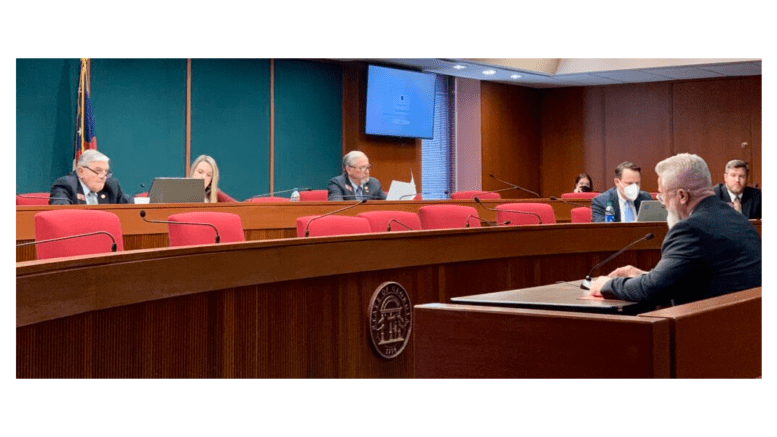by Stanley Dunlap, Georgia Recorder
March 21, 2022
District attorneys, a criminal defense lawyers group, and civil rights advocates on Monday warned a House panel considering a bill that would reshape how bail is handled for felonies that the change could unfairly keep more people locked up in jails who can’t afford bail and leave them unable to access treatment programs.
The House Public Safety and Homeland Security Subcommittee heard testimony for Senate Bill 504 that would require anyone arrested for a felony to pay cash bail or provide property as a bond in order to be released from jail.
A judge can now let someone avoid jail through “self-recognizance” by signing documents promising to appear in court instead of putting up cash or property as collateral.
Cataula Republican Sen. Randy Robertson’s bill would greatly expand the scope of “bail-restrictive” charges beyond the roughly 30 felony crimes, such as aggravated assault and other predominantly violent felonies, under existing law.
Prosecutors said Monday that if the bill becomes law on July 1, it will cover all 600 felonies that can be charged in Georgia, including obstruction of an officer or forgery for trying to pass off a stolen check.
DeKalb County District Attorney Sherry Boston said that while public safety is most important, punishing those accused of certain crimes before even being convicted could be counterproductive.
“We need to make sure that we cast the net so that we are catching those that we feel are a harm to the community, but not taking such a broad stroke that we capture folks that have made a legitimate mistake.” Boston said. “Those who are good people that have made poor choices.”
Robertson said his bill would clarify that all felonies require a bond after the Georgia Legislature passed a law last year covering violent felonies, a bill he also authored.
That law was in response to people with lengthy and dangerous criminal histories getting out without paying bond, only to wind up getting arrested again for other crimes.
All felony charges should require some type of bond, which will encourage more people to appear in court instead of skipping their hearing, Robertson said.
“If a judge feels that individual is in one of those situations where he or she cannot afford a large bond, the judge has discretion in setting that bond,” Robertson said. “For $25 or $50, whatever …because we have found that individuals that have some ‘skin in the game’ have a tendency to be more compliant with following through In the process.”
Boston, however, said it’s not practical to expect a judge to set really low bails for felony crimes when a misdemeanor bond for a low level offense like driving on a suspended license is usually about $1,500.
The measure is the latest example of the tough-on-crime legislation being promoted by many Republican lawmakers and the criminal justice reform gains over the last handful of years made with broad support from GOP and Democratic lawmakers and civil rights organizations.
The proposed law would be a significant departure from the bail reform measure the legislature passed in 2018, which required judges to consider a person’s financial situation when setting bail in misdemeanors.
At Monday’s hearing, Republican Rep. Danny Mathis, chair of the committee, said a vote on the bill could happen later in this session. The bill moved through the Senate on March 15 along a party-line split vote on the last day for bill’s to cross to the other chamber.
Representatives for the Southern Center for Human Rights, the statewide criminal defense attorneys association and lead prosecutors said that because of the wording of the bill, people who might be eligible for pretrial diversion programs for mental health or substance abuse might not receive needed services if they can’t pay bail.
Accountability court programs are designed to help people convicted of nonviolent crimes stay out of prison and get jobs while completing intensive programs that have reduced recidivism in Georgia and many other states, while also greatly cutting the costs to keep people incarcerated.
The programs became a focal point of criminal justice reform efforts under Republican Gov. Nathan Deal. And support for mental health and drug treatment programs are included in GOP House Speaker David Ralston’s milestone mental health package that’s before the legislature.
“(SB 504) takes away from us the ability to provide accountability and give them opportunities to get the treatment and services that they need so that this is not a way of life,” said Jared T. Williams, district attorney for the Augusta Judicial Circuit.
Atlanta Democratic Rep. Scott Holcomb, a former prosecutor, said he’s concerned about people being forced to remain in jail because they don’t have the financial means to pay bail.
Prosecutors and advocates say, however, that studies show that people who aren’t required to post bail are as likely to show up for court as those who have paid, and that the biggest factor often is not getting notices about court dates after they’ve been evicted or their phone has been cut off.
But Robertson said he is a strong advocate of accountability courts and disagreed that the bill would be harmful to the programs.
“While I appreciate the expertise of all those who testified, I did not hear one a single mention of a victim,” Robertson said. “Standing at the podium, I did not hear one person show any compassion or concern for the citizens of this state. The poor, the middle class, and the wealthy, who work every day and want to live in a safe community.”
Georgia Recorder is part of States Newsroom, a network of news bureaus supported by grants and a coalition of donors as a 501c(3) public charity. Georgia Recorder maintains editorial independence. Contact Editor John McCosh for questions: info@georgiarecorder.com. Follow Georgia Recorder on Facebook and Twitter.

